Crossway Classic Commentaries Series Collection (26 vols.)
Digital Logos Edition
For hundreds of years, the church has been blessed with Bible commentaries written by some of the greatest and most influential thinkers in recent history, highly respected for their godly walk and their insight into spiritual truth. The Crossway Classic Commentary series, carefully adapted for maximum understanding and usefulness, presents the very best work on individual Bible books for today’s believers.
Editors Alister McGrath and J. I. Packer draw from the wisdom of church history, inviting readers to listen to important voices of the past in order to discern how God might be speaking in the present—all while offering the best biblical scholarship from the past five centuries. McGrath and Packer have tailored these commentaries to the needs of thoughtful Christians—lay Christians, students, and those in ministry. As a result, the books in this collection convey the words and thoughts of the original authors, but faithfully communicate them in an understandable fashion. The originals, some of which were written at a highly technical level, have been abridged as needed and stylistically simplified.
What’s more, with the Logos editions of the Crossway Classic commentaries, you can perform powerful searches and access a wealth of other information from dictionaries, encyclopedias, and the rest of the titles in your Logos library. Hovering over scripture texts will display the scripture reference from your favorite Bible translation, and you can link the Crossway commentaries to the other commentaries in your library for research, analysis, and a fuller understanding of the Bible. For those wanting comprehensive commentaries on the Bible written in accessible language, this series—combined with the power of Logos—makes the greatest Bible teachers and theologians from the past 500 years available like never before.
These twenty six volumes will display as twenty five resources in your digital library.

- Contains introductions to each book by J.I. Packer
- Includes outlines and stylistic highlighting for each commentary
- Provides verse-by-verse commentary
The purpose of the Crossway Classic Commentaries is to make some of the most valuable commentaries on the books of the Bible, by some of the greatest Bible teachers and theologians in the last 500 hundred years, available to a new generation. These books will help today’s readers learn truth, wisdom, and devotion from such authors as J. C. Ryle, . . . John Calvin, J. B. Lightfoot, . . . Charles Spurgeon, [and] Charles Hodge . . .
We do not apologize for the age of some of the items chosen. In the realm of practical exposition promoting godliness, the old is often better than the new. Spiritual vision and authority, based on an accurate handling of the biblical text, are the qualities that have been primarily sought in deciding what to include.
So far as is possible, everything is tailored to the needs and enrichment of thoughtful readers—lay Christians, students, and those in the ministry. The originals, some of which were written at a high technical level, have been abridged as needed, simplified stylistically, and unburdened of foreign words. However, the intention of this series is never to change any thoughts of the original authors, but to faithfully convey them in an understandable fashion.
The publishers are grateful to Dr. Alister A. McGrath of Wycliffe Hall, Oxford, Dr. J. I. Packer of Regent College, Vancouver, and Watermark of Norfolk, England, for the work of selecting and editing that now brings this project to fruition.
- Title: Crossway Classic Commentaries Series Collection
- Editors: Alister McGrath and J. I. Packer
- Publisher: Crossway
- Publication Date: 1993–2001
- Series: Crossway Classic Commentaries
- Volumes: 26
- Resources: 25
- Pages: 7,112
- Format: Digital › Logos Research Edition
- Resource ID: {CE564F8B-EF64-47FB-BA28-4632008A0E41}
Individual Titles
- Genesis by John Calvin
- Psalms (2 vols.) by Charles Spurgeon
- Proverbs by Charles Bridges
- Isaiah by John Calvin
- Jeremiah and Lamentations by John Calvin
- Matthew by J. C. Ryle
- Mark by J. C. Ryle
- Luke by J. C. Ryle
- John by John Calvin
- Acts by John Calvin
- Romans by Charles Hodge
- 1 Corinthians by Charles Hodge
- 2 Corinthians by Charles Hodge
- Galatians by Martin Luther
- Ephesiansby Charles Hodge
- Philippians by J. B. Lightfoot
- Colossians and Philemon by J. B. Lightfoot
- 1 & 2 Thessalonians by John Calvin
- 1 & 2 Timothy and Titus by John Calvin
- Hebrews by John Owen
- James by Thomas Manton
- 1 & 2 Peter by Robert Leighton and Griffith Thomas
- 1, 2, 3 Johnby John Calvin and Matthew Henry
- Jude by Thomas Manton
- Revelation by Matthew Henry
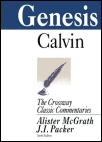
With its memorable stories and important beginnings, Genesis is one of the most enjoyable Old Testament books. It is more than just a history, however; the Bible’s first book acquaints us with several aspects of the knowledge of God and ourselves, and thus lays the foundation of Christianity.
John Calvin notes four theological themes which run through this ancient book and into our hearts and lives today—including our ruinous guilt with its resulting radical alienation from God, and God’s pervasive love which redeems us. Calvin’s ability to discern character and motivation from clues in the text, blended with his understanding of humanity’s condition, creates a work that is constantly probing and practical—a thought-provoking and faithful exploration of this great book.
John Calvin (1509–1564) was perhaps the Reformation’s most influential Bible teacher. He had a powerful influence on many Christian leaders, including John Knox, John Bunyan, Charles Spurgeon, William Carey, George Whitefield, and Jonathan Edwards. Known best for his Institutes of the Christian Religion, Calvin also wrote landmark expositions on most of the books of the Bible. In addition to Calvin’s commentary on Genesis in this collection, Logos also offers Calvin’s Commentaries (46 vols.), the Institutes of the Christian Religion, and the Calvin 500 Collection.
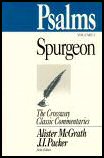
This commentary shares practical encouragement from a favorite Bible book. Charles H. Spurgeon spent 20 years compiling his seven-volume exposition of Psalms, which Crossway has carefully edited for the modern reader. In the words of Spurgeon in his Preface: “None but the Holy Spirit can give man the key to the Treasury of David; and even he gives it rather to experience than to study. Happy he who for himself knows the secret of the Psalms. In these busy days, it would be greatly to the spiritual profit of Christians if they were more familiar with the book of Psalms, in which they would find a complete armory for life’s battles, and a perfect supply for life’s needs.”
Charles Haddon Spurgeon was born in Kelvedon, Essex, England on June 19, 1834. He converted to Christianity in 1850 at a small Methodist chapel, to which he detoured during a snowstorm. While there, he heard a sermon on Isaiah 45:22 and was saved—“Look unto me, and be ye saved, all the ends of the earth, for I am God, and there is none else.” He began his own ministry of preaching and teaching immediately, and preached more than 500 sermons by the age of 20.
In 1854, at 19 years of age, Spurgeon began preaching at the New Park Street Chapel in London. He was appointed to a six month trial position, which he requested be cut to three months should the congregation dislike his preaching. He gained instant fame, however, and the church grew from 232 members to more than 5,000 at the end of his pastorate. Many of his sermons were published each week and regularly sold more than 25,000 copies in 20 languages. Throughout his ministry, Spurgeon estimated that he preached to more than 10 million people. Dwight L. Moody was deeply influenced by Spurgeon’s preaching, and founded the Moody Bible Institute after seeing Spurgeon’s work at the Pastor’s College in London.
Spurgeon read six books per week during his adult life, and read Pilgrim’s Progress more than 100 times. In addition to his studying and preaching, Spurgeon also founded the Pastor’s College (now Spurgeon’s College), various orphanages and schools, mission chapels, and numerous other social institutions.
Charles Spurgeon suffered from poor health throughout his life. He died on January 31, 1892, and was buried in London. In addition to this volume, Logos also offers the Charles Spurgeon Collection (86 vols.).
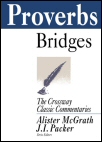
While other parts of Scripture show the glory of the Christian’s high calling, Proverbs instructs in detail how to walk in and be worthy of this calling. A treasure trove of divine wisdom, Proverbs challenges readers to actively seek its priceless truths about daily living. Charles Bridge’s classic work provides the map.
He divides Proverbs into three general sections, interpreting each nugget of instruction canonically—that is, as an organic part of the Bible as a whole—and evangelically—that is, assuming the change of heart through the Holy Spirit’s regenerating action about which evangelical theology is explicit—and practically—that is, as a guide to wise and godly behavior in all human relationships. With Charles Bridge’s stimulating insights as a guide, you will find Proverbs to be a rare and extraordinary book which impresses on your heart the importance of faith’s fundamentals, the value of self-discipline, and the impact of bringing everything under the Word of God.
Charles Bridges (1794–1869) was a well-known and prominent leader of the Evangelical Party in the Church of England. He is best remembered for his Old Testament commentaries and The Christian Ministry, his 1829 treatise on pastoral ministry that remains influential today.
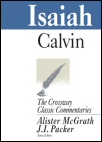
Rich imagery and glimpses of God’s character abound in the book of Isaiah. Even as the prophet cried out against Judah’s empty idolatry and warned of the judgment they would receive, he stressed God’s holiness, patience, and mercy. Redemption is Isaiah’s central theme, evidenced in his declarations about Judah’s temporal need for salvation—and every person’s eternal need. Consequently Isaiah, more than any other prophet, foretold the coming of the Messiah and all that would follow.
John Calvin delights to point out the numerous passages that were fulfilled during Christ’s earthly ministry, and with anticipation, he expounds upon those which are yet to be realized. Accordingly, he explains Isaiah’s emphasis on God’s attributes and the prophet’s message that salvation is God’s chief work. The lessons in Isaiah are powerful and, with Calvin’s insightful commentary, are sure to inspire every believer.
John Calvin (1509–1564) was perhaps the Reformation’s most influential Bible teacher. He had a powerful influence on many Christian leaders, including John Knox, John Bunyan, Charles Spurgeon, William Carey, George Whitefield, and Jonathan Edwards. Known best for his Institutes of the Christian Religion, Calvin also wrote landmark expositions on most of the books of the Bible. In addition to Calvin’s commentary on Genesis in this collection, Logos also offers Calvin’s Commentaries (46 vols.), the Institutes of the Christian Religion, and the Calvin 500 Collection.
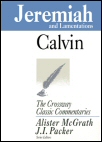
The prophet Jeremiah warned Judah for 40 years of God’s impending punishment for her flagrant disobedience of his commands. The many messages of judgment, though, were mixed with promises of the mercy Judah would receive if only she would repent. The weeping prophet lamented over the people’s obstinacy and the resulting calamities, yet always reminded them of the hope they would find in God’s compassion—and the restoration that would come in their repentance.
This commentary began as 193 hour-long classroom lectures, given near the end of John Calvin’s life at the rate of three per week extemporarily in Latin to a mixed bag of senior schoolboys, pastors, and ministerial students from all over Europe. Speaking as if personally acquainted with the prophet, John Calvin explains Jeremiah’s emphasis on God’s mercy and kindness toward his chosen but erring people. Just as Jeremiah looked forward to the future messianic kingdom, Calvin’s enthusiasm never wanes as he applies the prophet’s teaching to both the church and individual Christians.
John Calvin (1509–1564) was perhaps the Reformation’s most influential Bible teacher. He had a powerful influence on many Christian leaders, including John Knox, John Bunyan, Charles Spurgeon, William Carey, George Whitefield, and Jonathan Edwards. Known best for his Institutes of the Christian Religion, Calvin also wrote landmark expositions on most of the books of the Bible. In addition to Calvin’s commentary on Genesis in this collection, Logos also offers Calvin’s Commentaries (46 vols.), the Institutes of the Christian Religion, and the Calvin 500 Collection.
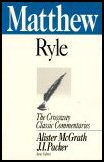
This volume is a fascinating treatment of the first Gospel. Well exegeted, accompanied by encouraging practical application, this helpful volume shares the power of God’s promises fulfilled in God-become-man, Jesus Christ. Familiar passages come alive in the exposition given by a great man of faith; new gems of understanding and vision fuel heart-felt worship and new commitment for holy living.
J. C. Ryle (1816–1900) was educated at Christ Church, Oxford, where he was a Craven Scholar. He was ordained in 1841, and became the first bishop of Liverpool in 1880. Ryle was a prolific writer his entire life, publishing dozens of bestsellers that were translated into many languages. In addition to this volume, Logos also offers the J. C. Ryle Collection (18 vols.).
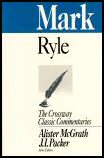
This commentary is a dynamic discussion of the second Gospel. Here is all the excitement and fervor of this action-packed biography of our precious Savior, the Lord Jesus Christ. Familiar and not-so-familiar passages bring deep encouragement and powerful vision, leading to inner renewal and holier living. A potent volume sure to enlighten and strengthen all modern-day believers as they seek to serve their Master!
J. C. Ryle (1816–1900) was educated at Christ Church, Oxford, where he was a Craven Scholar. He was ordained in 1841, and became the first bishop of Liverpool in 1880. Ryle was a prolific writer his entire life, publishing dozens of bestsellers that were translated into many languages. In addition to this volume, Logos also offers the J. C. Ryle Collection (18 vols.).
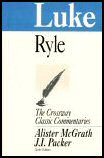
J. C. Ryle presents an encouraging treatment of the third Gospel—the life of Christ as told by “the beloved physician” under the direction of God’s Spirit. The teachings and miracles of our Savior come to life in a powerful way, producing deeper devotion and increasing commitment in the hearts of those who follow the Master. An assuring volume that will strengthen and encourage Christian believers as they seek to better understand what it means to walk with Christ day by day.
J. C. Ryle (1816–1900) was educated at Christ Church, Oxford, where he was a Craven Scholar. He was ordained in 1841, and became the first bishop of Liverpool in 1880. Ryle was a prolific writer his entire life, publishing dozens of bestsellers that were translated into many languages. In addition to this volume, Logos also offers the J. C. Ryle Collection (18 vols.).
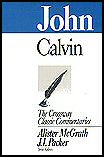
The Gospel of John, called “the spiritual Gospel” in early church history, is among the most profound books of the New Testament. A powerful portrayal of the early life and ministry of our Lord and Savior, Jesus Christ, it explores precious tenets of the faith, Christ’s nature, his reasons for coming to earth, his determination to fulfill the father’s will by giving his own life for us, the splendor of his miracles, and the supremacy of his love. Calvin’s superb exegesis of the fourth Gospel is made available in this helpful volume that will enrich the faith of new and mature Christians alike.
John Calvin (1509–1564) was perhaps the Reformation’s most influential Bible teacher. He had a powerful influence on many Christian leaders, including John Knox, John Bunyan, Charles Spurgeon, William Carey, George Whitefield, and Jonathan Edwards. Known best for his Institutes of the Christian Religion, Calvin also wrote landmark expositions on most of the books of the Bible. In addition to Calvin’s commentary on Genesis in this collection, Logos also offers Calvin’s Commentaries (46 vols.), the Institutes of the Christian Religion, and the Calvin 500 Collection.
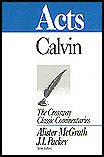
The book of Acts provides an invaluable transition in the Bible from the life of Christ to the formation and expansion of the New Testament church, early struggles in the body of Christ, and the conversion and later missionary journeys of Paul, making for enlightening and nurturing reading for all followers of the Lord Jesus Christ. John Calvin’s insightful examination of this action-packed, fast-paced section of Scripture will give serious Bible students a solid grip on the key passages and themes of Acts. And that in turn will give believers renewed enthusiasm and boldness in taking the good news of Christ to their own time and setting.
John Calvin (1509–1564) was perhaps the Reformation’s most influential Bible teacher. He had a powerful influence on many Christian leaders, including John Knox, John Bunyan, Charles Spurgeon, William Carey, George Whitefield, and Jonathan Edwards. Known best for his Institutes of the Christian Religion, Calvin also wrote landmark expositions on most of the books of the Bible. In addition to Calvin’s commentary on Genesis in this collection, Logos also offers Calvin’s Commentaries (46 vols.), the Institutes of the Christian Religion, and the Calvin 500 Collection.
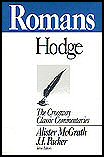
Perhaps there is no clearer and more systematic treatise on the gospel of Jesus Christ than that found in Paul’s Epistle to the Romans. Christian believers through the centuries have fed deeply on its themes of the sinfulness of man, the richness of God’s mercy, the transforming power of Jesus Christ in the repentant life, the believer’s participation in the Savior’s death and resurrection, and the practical implications of spiritual truth for daily life. This classic commentary is a treasure for all who desire a deeper walk with God. Whether used for supplementary reading or for careful study, it will prove profitable to every follower of Christ who avails himself or herself of its gems.
Charles Hodge (1797–1878) counts as one of the most influential theologians of the nineteenth century and one of Calvinism’s most ardent defenders in America. He was born in Philadelphia to Hugh and Mary Hodge. He graduated from the College of New Jersey (Princeton University) in 1815, and was ordained in the Presbyterian Church in 1821. In 1822, at the request of Archibald Alexander, he became a professor at Princeton, and taught biblical literature and systematic theology until 1878. From 1826 to 1828, Hodge also studied in Europe, and became acquainted with Friedrich Augustus Tholuck, Wilhelm Gesenius, Augustus Neander, and Friedrich Schleiermacher.
During his tenure at Princeton, Hodge instructed more than 3,000 ministers, served as moderator of the Presbyterian General Assembly in 1846, helped revise the Presbyterian Church’s Book of Discipline, and served on the Board of Foreign Missions. He also founded the Biblical Repertory and Princeton Review and served as its editor for 43 years. In addition to his systematic theology and four Bible commentaries, Hodge also wrote books on the Presbyterian Church and published numerous articles.
Charles Hodge died on June 19, 1878. Among his last words: “To be absent from the body is to be with the Lord, to be with the Lord is to see the Lord, to see the Lord is to be like him.” In addition to this volume, Logos also offers The Works of Charles Hodge (29 vols.).
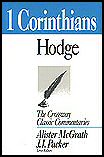
The apostle Paul’s epistles to the church at Corinth are masterpieces of spiritual truth applied to crises within the church—crises of both belief and practice. In his first letter Paul gives the Corinthian believers an honest inventory of their spiritual strengths and weaknesses—fully gifted and yet divided; believing foundational gospel truth and yet condoning immorality and doctrinal distortions—and urges them to fully commit themselves to Christ. This classic commentary is a treasure for all who desire a closer walk with God. Whether used for supplementary reading or for careful study, it will prove profitable to every follower of Christ who opens his or her heart to its gems.
Charles Hodge (1797–1878) counts as one of the most influential theologians of the nineteenth century and one of Calvinism’s most ardent defenders in America. He was born in Philadelphia to Hugh and Mary Hodge. He graduated from the College of New Jersey (Princeton University) in 1815, and was ordained in the Presbyterian Church in 1821. In 1822, at the request of Archibald Alexander, he became a professor at Princeton, and taught biblical literature and systematic theology until 1878. From 1826 to 1828, Hodge also studied in Europe, and became acquainted with Friedrich Augustus Tholuck, Wilhelm Gesenius, Augustus Neander, and Friedrich Schleiermacher.
During his tenure at Princeton, Hodge instructed more than 3,000 ministers, served as moderator of the Presbyterian General Assembly in 1846, helped revise the Presbyterian Church’s Book of Discipline, and served on the Board of Foreign Missions. He also founded the Biblical Repertory and Princeton Review and served as its editor for 43 years. In addition to his systematic theology and four Bible commentaries, Hodge also wrote books on the Presbyterian Church and published numerous articles.
Charles Hodge died on June 19, 1878. Among his last words: “To be absent from the body is to be with the Lord, to be with the Lord is to see the Lord, to see the Lord is to be like him.” In addition to this volume, Logos also offers The Works of Charles Hodge (29 vols.).
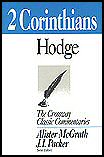
The Apostle Paul’s epistles to the church at Corinth are masterpieces of spiritual truth applied to crisis within the church—crises of both belief and practice. In his second letter to the Corinthians, the most personal and heart-wrenchingly honest of all his epistles, Paul commends the value of earthly trials—God’s power at work in our weakness; inner renewal despite outward suffering; eternal treasures—that resoundingly testifies to God’s faithfulness in adversity. Whether used for supplementary reading or for careful study, it will prove profitable to every follower of Christ who opens his or her heart to its gems.
Charles Hodge (1797–1878) counts as one of the most influential theologians of the nineteenth century and one of Calvinism’s most ardent defenders in America. He was born in Philadelphia to Hugh and Mary Hodge. He graduated from the College of New Jersey (Princeton University) in 1815, and was ordained in the Presbyterian Church in 1821. In 1822, at the request of Archibald Alexander, he became a professor at Princeton, and taught biblical literature and systematic theology until 1878. From 1826 to 1828, Hodge also studied in Europe, and became acquainted with Friedrich Augustus Tholuck, Wilhelm Gesenius, Augustus Neander, and Friedrich Schleiermacher.
During his tenure at Princeton, Hodge instructed more than 3,000 ministers, served as moderator of the Presbyterian General Assembly in 1846, helped revise the Presbyterian Church’s Book of Discipline, and served on the Board of Foreign Missions. He also founded the Biblical Repertory and Princeton Review and served as its editor for 43 years. In addition to his systematic theology and four Bible commentaries, Hodge also wrote books on the Presbyterian Church and published numerous articles.
Charles Hodge died on June 19, 1878. Among his last words: “To be absent from the body is to be with the Lord, to be with the Lord is to see the Lord, to see the Lord is to be like him.” In addition to this volume, Logos also offers The Works of Charles Hodge (29 vols.).
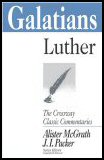
Ever since it was written, the Apostle Paul’s letter to the believers in Galatia has nurtured trust and assurance in Christ. Its grand themes of the superiority of Scripture over human reason, the sufficiency of Christ’s atonement through his death, and the freedom of justification through faith alone continue to energize and enlighten Christians today.
This classic commentary from Martin Luther will encourage and equip all who desire to understand, live out, and communicate the true gospel of Jesus Christ.
Martin Luther (1483–1546) stands as one of the most significant figures in Western history. His distinction as the father of the Protestant Reformation is augmented by his innovative use of new technology (the printing press), his translation of the Christian Bible into the vernacular, and his impact upon European society. Born in 1483 to middle-class parents in Saxony, eastern Germany, he became an Augustinian monk, a priest, a professor of biblical literature, a reformer, a husband, and father. He died in 1546 after having witnessed the birth of a renewal movement that would result in a profound shift in faith, politics, and society. He has been both praised and vilified for what he preached and wrote. His thought continues to influence all Christians and to animate the movement that bears his name.
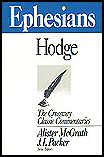
The Apostle Paul’s epistle to the Ephesian Christians has long brought spiritual encouragement to God’s people. The believer’s heart is filled with joy by the abundance of our spiritual resources in Christ; salvation by grace through faith, not through works; heavenly exhortations for Christian families on earth; and the inventory of the weapons God provides for spiritual battle. Whether used for supplementary reading or for careful study, Charles Hodge’s helpful commentary will prove profitable to every follower of Christ who opens his or her heart to the gems in Ephesians.
Charles Hodge (1797–1878) counts as one of the most influential theologians of the nineteenth century and one of Calvinism’s most ardent defenders in America. He was born in Philadelphia to Hugh and Mary Hodge. He graduated from the College of New Jersey (Princeton University) in 1815, and was ordained in the Presbyterian Church in 1821. In 1822, at the request of Archibald Alexander, he became a professor at Princeton, and taught biblical literature and systematic theology until 1878. From 1826 to 1828, Hodge also studied in Europe, and became acquainted with Friedrich Augustus Tholuck, Wilhelm Gesenius, Augustus Neander, and Friedrich Schleiermacher.
During his tenure at Princeton, Hodge instructed more than 3,000 ministers, served as moderator of the Presbyterian General Assembly in 1846, helped revise the Presbyterian Church’s Book of Discipline, and served on the Board of Foreign Missions. He also founded the Biblical Repertory and Princeton Review and served as its editor for 43 years. In addition to his systematic theology and four Bible commentaries, Hodge also wrote books on the Presbyterian Church and published numerous articles.
Charles Hodge died on June 19, 1878. Among his last words: “To be absent from the body is to be with the Lord, to be with the Lord is to see the Lord, to see the Lord is to be like him.” In addition to this volume, Logos also offers The Works of Charles Hodge (29 vols.).
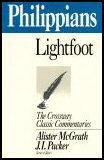
Many Christians consider the apostle Paul’s letter to the Philippians a special treasure. Its grand themes of spiritual joy and vitality, the self-humbling Savior who gave his life for us, the good news of a salvation that is superior to the boastings of the flesh—these and other gems still nurture followers of Jesus Christ today. This classic commentary will deeply encourage all who long to draw closer to God.
Joseph Barber Lightfoot was educated at Cambridge and Oxford, became the lord bishop of Durham in the church of England, served as a minister in St. Paul’s Cathedral in London, and was professor of divinity at Cambridge University. He was also one of the original members of the New Testament Company of Bible Revisers. Be sure to check out his other works in the 11 volume Joseph Barber Lightfoot Collection.
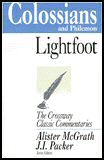
Christians throughout the centuries have marveled at the spiritual treasures in the apostle Paul’s letters to the Colossians and to Philemon. Grand themes of the supremacy of Christ, the superiority of the gospel over false belief systems, the joy of setting one’s focus on things above, and the love-bonds between all followers of the savior continue to inspire Christians today. This classic commentary will encourage and equip all who desire a deeper walk with God and a growing faith in him.
Joseph Barber Lightfoot was educated at Cambridge and Oxford, became the lord bishop of Durham in the church of England, served as a minister in St. Paul’s Cathedral in London, and was professor of divinity at Cambridge University. He was also one of the original members of the New Testament Company of Bible Revisers. Be sure to check out his other works in the 11 volume Joseph Barber Lightfoot Collection.
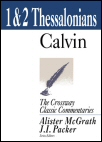
Forced out of Thessalonica by the Jews for his effective ministry, Paul wrote to encourage and teach new believers there. His first letter, according to John Calvin, contains a brief definition of true Christianity. It is a faith that is full of vigor, employing itself in the labors of love, intent upon the hope of the manifestation of Christ, despising everything else, and armed with an endurance that rises above the weariness of time and worldly temptations. Paul’s second epistle then expands upon and clarifies some of his teachings from the first letter.
John Calvin delves into the rich meaning of Paul’s encouraging words. He brings insight into the historical church, as well as instructing today’s pastors on maintaining a healthy church and inspiring believers to grow in their daily walk.
John Calvin (1509–1564) was perhaps the Reformation’s most influential Bible teacher. He had a powerful influence on many Christian leaders, including John Knox, John Bunyan, Charles Spurgeon, William Carey, George Whitefield, and Jonathan Edwards. Known best for his Institutes of the Christian Religion, Calvin also wrote landmark expositions on most of the books of the Bible. In addition to Calvin’s commentary on Genesis in this collection, Logos also offers Calvin’s Commentaries (46 vols.), the Institutes of the Christian Religion, and the Calvin 500 Collection.
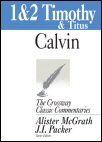
Timothy and Titus were two of Paul’s faithful associates. When problems arose in a church, Paul knew he could depend on either one of them to handle the situation. In these three epistles, Paul encourages his younger colleagues in their roles as pastors. He advises them on worship, leadership, integrity issues, and generation gaps. With confidence, the aging apostle passes the torch of faith and exhorts them to be Christ’s representatives on earth.
John Calvin’s exploration of the key passages of these three pastoral epistles not only provides historical insight into the early church, but also guidance and encouragement for pastors and lay leaders today.
John Calvin (1509–1564) was perhaps the Reformation’s most influential Bible teacher. He had a powerful influence on many Christian leaders, including John Knox, John Bunyan, Charles Spurgeon, William Carey, George Whitefield, and Jonathan Edwards. Known best for his Institutes of the Christian Religion, Calvin also wrote landmark expositions on most of the books of the Bible. In addition to Calvin’s commentary on Genesis in this collection, Logos also offers Calvin’s Commentaries (46 vols.), the Institutes of the Christian Religion, and the Calvin 500 Collection.
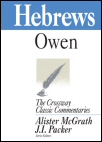
The author of Hebrews wanted his audience to know and understand one truth: Christ is superior, and therefore, so is Christianity. The person of Christ is better than prophets and angels, his priesthood is greater than that of Melchizedek and the line of Aaron, and his power within the believer’s life is incomparable. Between these contrasts, the author of Hebrews exhorts readers to persevere in their faith, be obedient, grow in their understanding, and to be careful not to miss the grace of God.
John Owen’s unveiling of this text gives pastors and students of the Bible a thorough handle on its key passages. The message of Hebrews proves that Jesus Christ is still the savior the world needs today. Contemporary believers will be inspired by it as they seek to uphold and defend Christ’s supremacy in a pluralistic world.
John Owen (1616–1683) was vice chancellor of Oxford University and served as advisor and chaplain to Oliver Cromwell. Among the most learned and active of the Puritans in seventeenth-century Europe, he was an erudite and accomplished theologian both in doctrine and practical theology. In addition to Owen’s commentary on Hebrews in this collection, Logos also offers the unabridged 7-volume Exposition of the Epistle to the Hebrews.
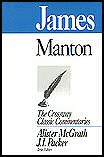
The epistle of James abounds with punch and clarity. Amazingly relevant and practical for our age, it continues to be a popular New Testament book for followers of Christ. Its themes, which include good works issuing out of genuine faith, equal treatment of the rich and poor, taming the tongue, heavenly wisdom, and patience in the midst of suffering, have brought great encouragement to God’s people. Whether used for supplementary reading or for careful study, it will prove profitable to every follower of Christ who opens his or her heart to its gems.
Thomas Manton (1620–1677) played a prominent role in the Savoy Conference and the drafting of the Westminster Confession. He was pastor of a noted Puritan congregation in London but was later ejected from the official Church for nonconformity, though he continued to preach wherever and whenever he had opportunity. Archbishop Usher called him “one of the greatest preachers in England.” His sermons formed the basis of his published commentaries. Check out The Complete Works of Thomas Manton (22 Vols.)!
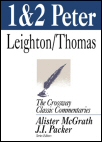
Addressed to persecuted believers, Peter’s first letter encourages them with the knowledge that it is possible to live victoriously in the midst of hostility—just as Christ did. He exhorts them to live a holy life, in order to evangelize the world through their faithfulness. In his second epistle, Peter warns against more subtle dangers from within the church—false teachers and errant doctrine. He also emphasizes the importance of scriptural knowledge, for only in understanding true doctrine will heresies be known and immoral behavior exposed.
Robert Leighton (1611–1684) was archbishop of Glasgow and a Scottish Presbyterian minister. Spurgeon called Leighton’s commentary on 1 Peter “a true heavenly work.”
Griffith Thomas (1861–1924) was a leading evangelical writer and Anglican vicar of the central London parish of St. Paul’s at the turn of the twentieth century.
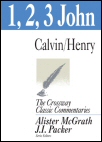
John’s epistles have enriched and equipped the followers of Christ down through the centuries. The themes—such as walking in the truth, acknowledging our proneness to sin, being wary of the lies of the antichrist, and denying ourselves the empty enticements of the world—continue to be invaluable for the people of God.
This classic commentary will help contemporary Christians obtain a deeper understanding of the letters of John and experience a growing godliness in the process.
John Calvin (1509–1564) was perhaps the Reformation’s most influential Bible teacher. He had a powerful influence on many Christian leaders, including John Knox, John Bunyan, Charles Spurgeon, William Carey, George Whitefield, and Jonathan Edwards. Known best for his Institutes of the Christian Religion, Calvin also wrote landmark expositions on most of the books of the Bible. In addition to Calvin’s commentary on Genesis in this collection, Logos also offers Calvin’s Commentaries (46 vols.), the Institutes of the Christian Religion, and the Calvin 500 Collection.
Matthew Henry (1662–1714) achieved a standard of applied analysis that has long marked his work as superior. In addition to Henry’s commentary on 1, 2, & 3 John in this collection, Logos also offers Matthew Henry’s Commentary on the Bible, complete and unabridged, in six volumes.
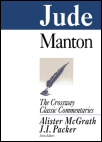
Jude devoted his entire epistle exclusively to confronting those who had defected from the true biblical faith and the false teachers who had led them astray. Revealing the character of these godless men who changed the grace of God into a license for immorality, Jude calls the church to discernment. He also encourages believers to persevere in their faith with prayer and the knowledge that the wicked will be punished.
Thomas Manton (1620–1677) played a prominent role in the Savoy Conference and the drafting of the Westminster Confession. He was pastor of a noted Puritan congregation in London but was later ejected from the official Church for nonconformity, though he continued to preach wherever and whenever he had opportunity. Archbishop Usher called him “one of the greatest preachers in England.” His sermons formed the basis of his published commentaries. Check out The Complete Works of Thomas Manton (22 Vols.)!
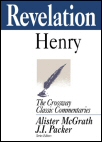
No other New Testament book poses more serious and difficult interpretative challenges than Revelation. Full of vivid imagery and striking symbolism, the church is ultimately reminded of God’s sovereignty to accomplish his purposes regardless of any opposition. The Lamb of God will be the victor in the moral and spiritual conflict of the ages. This eschatological book portrays the last battle of human history, the career and defeat of the antichrist, Christ’s millennial reign, and his judgment of the wicked and the righteous. The Apostle John’s vision of the glorified Christ and the last times both exhorts and instructs believers. With Matthew Henry’s timeless insights into Revelation’s key passages, this commentary is especially relevant for today’s readers.
Matthew Henry (1662–1714) achieved a standard of applied analysis that has long marked his work as superior. In addition to Henry’s commentary on 1, 2, & 3 John in this collection, Logos also offers Matthew Henry’s Commentary on the Bible, complete and unabridged, in six volumes.
About the Editors
J. I. Packer was born in 1926 in Gloucester, England and studied at Oxford University before becoming ordained in the Church of England in 1952. He was influenced by the Puritan writings of John Owen and Richard Baxter, the preaching of Martyn Lloyd-Jones, and the teaching of C. S. Lewis, whom he met at Oxford. In 1979, Packer became professor of historical and systematic theology at Regent College in Vancouver, British Columbia.
Packer is a prolific writer, and has written numerous books and articles. His popular Knowing God has sold more than one million copies and has been translated into 10 languages. He also served as the general editor for the English Standard Version of the Bible, and currently serves as an executive editor at Christianity Today. Packer was included in Time’s list of the 25 most influential evangelicals in America, and is widely considered one of the most important theologians of the late twentieth century.
Alister McGrath was born in 1953 in Belfast, Northern Ireland. He studied applied mathematics, physics, and chemistry at the Methodist College in Belfast, and began studying chemistry at Oxford University in 1971. In 1980 he was ordained in the Church of England, and was appointed professor of historical theology at Oxford University. McGrath is a prolific writer, authoring books and articles on scientific and theological topics. He is an outspoken critic of scientific naturalism in general and new atheism in particular. He has debated notable atheists such as Richard Dawkins and Daniel Dennett both in person and in print, and advocates scientific theology. McGrath gave the prestigious Gifford Lectures in June, 2009.
Reviews
7 ratings

Forrest Cole
11/9/2021
Dr. Anthony Mazak
3/27/2021
GracePoint Plant City
11/12/2017

Ian Carmichael
1/7/2017
A superb, classic collection. And with the additional connections provided by the Logos system, to be thoroughly recommended to all building up a decent library of both classic and contemporary key works. These provide a great start to the classics!
Vincent Chia
10/6/2016

Debra W Bouey
6/5/2016

John L. Jefferson
9/10/2014

Jeffrey Willis
3/30/2014
Great set. Used it when reading Luke. A hybrid commentary and devotional.